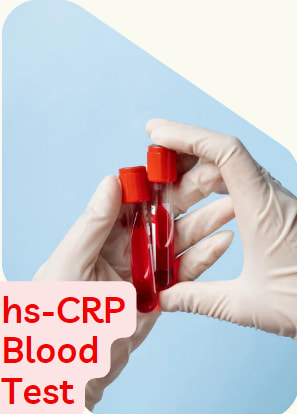Content :
◉ What is hs-CRP test?
The high-sensitive C-reactive protein hs-CRP test is a blood test that measures very low levels of C-reactive protein (CRP) in your blood.
The hs-CRP test employs highly sensitive immunoassay techniques, such as nephelometry or high-sensitivity enzyme-linked immunosorbent assay (ELISA), to detect CRP levels down to very low concentrations, often in the range of 0.1 to 1.0 mg/L.
More sensitive than a standard CRP test, the hs-CRP is generally used as a predictive marker of cardiac disease risk and stroke in apparently healthy individuals.
The application of this test is still controversial, and it is currently undergoing further evaluation. The interpretation must be done by your healthcare provider.

◉ Why do I need this test?
- The hs-CRP test is used to assess the risk of developing coronary heart disease and stroke in individuals without pre-existing heart disease.
- It is also used in individuals with or without risk factors for the development and progression of vascular diseases.
- Additionally, it can help diagnose and monitor several chronic inflammatory diseases such as rheumatoid arthritis or lupus, even when C-reactive protein levels are very low.
- In some cases, an hs-CRP test may be used to monitor how well your body responds to anti-inflammatory treatments or medications.
◉ Prepare for the test
The hs-CRP test is a simple blood test that can be performed at any time during the day. There is no specific timing restriction associated with the test. However, you may need to follow these steps:
- Avoid intense exercise such as weight training or long runs before the test, as it can cause a sudden jump in CRP levels.
- Inform your healthcare provider about any medications you take, as some medications can affect CRP levels.
- If your blood sample will be used for other tests, you may need to fast for a period before the test. Your healthcare provider will provide specific instructions based on the tests being conducted.
- Keeping well-hydrated is generally recommended before any blood test. Drink plenty of water to ensure proper hydration.
◉ What is the normal range of hs-CRP test?
The normal range for high-sensitive C-reactive protein test scores can vary depending on the laboratory and the specific assay used. It's important to note that reference ranges may differ among different populations, age groups, and individuals with certain medical conditions.
The interpretation of hs-CRP test results should be done in consultation with a healthcare professional. Here is a general overview:
- Low-risk range: Typically, hs-CRP levels below 1.0 mg/L are considered within the low-risk range. This indicates minimal inflammation or a lower risk of cardiovascular events.
- Moderate-risk range: Levels between 1.0 and 3.0 mg/L are generally considered within the moderate-risk range. This suggests a moderate degree of inflammation and an intermediate risk of cardiovascular events.
- High-risk range: hs-CRP levels above 3.0 mg/L are generally considered within the high-risk range. This indicates a higher degree of inflammation and an increased risk of cardiovascular events.
◉ High levels of hs-CRP
◉ 1. Causes
- Infections: Bacterial, viral, or fungal infections, such as pneumonia, urinary tract infections, or viral hepatitis, can cause an elevation in hs-CRP levels.
- Inflammatory conditions: Chronic inflammatory diseases, such as rheumatoid arthritis, systemic lupus erythematosus (SLE), or inflammatory bowel disease (IBD), can lead to increased hs-CRP levels.
- Tissue injury: Trauma, surgery, or tissue damage from conditions like myocardial infarction (heart attack) or stroke can trigger an inflammatory response, resulting in elevated hs-CRP levels.
- Obesity: Adipose tissue produces inflammatory cytokines, and individuals with excess body fat may have higher hs-CRP levels.
- Smoking: Cigarette smoking is associated with increased inflammation, leading to higherhs-CRPlevels.
- Certain medications.
◉ 2. Symptoms
Elevated hs-CRP levels themselves do not cause specific symptoms. Instead, the symptoms experienced are usually related to the underlying condition causing the inflammation. For example:
- Infections: Fever, fatigue, body aches, cough, or other specific symptoms based on the site of infection.
- Inflammatory conditions: Joint pain, stiffness, swelling, skin rashes, gastrointestinal symptoms, or other symptoms specific to the condition.
- Tissue injury: Pain, swelling, bruising, or other symptoms depending on the affected area.
◉Low levels of hs-CRP
◉ Causes
- Absence of inflammation: Low hs-CRP levels are commonly observed in individuals without ongoing inflammation or acute infections.
- Effective treatment: If an individual had elevated hs-CRP levels in the past due to an underlying condition, successful treatment or resolution of that condition can lead to a decrease in hs-CRP levels.
- Medications: Certain medications, such as statins (cholesterol-lowering drugs), may lower hs-CRP levels as they have anti-inflammatory effects.
◉ The difference between hs-CRP test and standard CRP test.
- The hs-CRP test is more sensitive than the standard CRP test, meaning it can detect smaller increases in CRP levels.
- The standard CRP test is generally used to evaluate general inflammation, while the hs-CRP test focuses on the risk of heart disease and stroke.
- The hs-CRP test measures CRP in the range from 0.1 to 500 mg/L, while the standard CRP test measures CRP in the range from 3 to 1000 mg/L.
◉ Related Tests
- Sedimentation Rate (Sed Rate) Test
- Rheumatoid Factor (RF)
- Anti-CCP (Anti-Cyclic Citrullinated Peptide) Test
- Complete blood count (CBC)
- Cardiac Enzymes tests, such as troponin and creatine kinase-MB.
◉ Conclusion
The high-sensitive CRP test is a valuable tool in the field of medicine, particularly in the diagnosis and management of cardiovascular diseases. This advanced testing method allows for the detection of CRP levels at extremely low concentrations, enabling healthcare professionals to identify inflammation and assess the risk of cardiovascular events with greater precision.
However, it is important to note that the hs-CRP test should be used in conjunction with other clinical assessments to provide a comprehensive evaluation of a patient's cardiovascular health. It is not a standalone diagnostic tool but rather a valuable addition to the cardiovascular risk assessment tools.